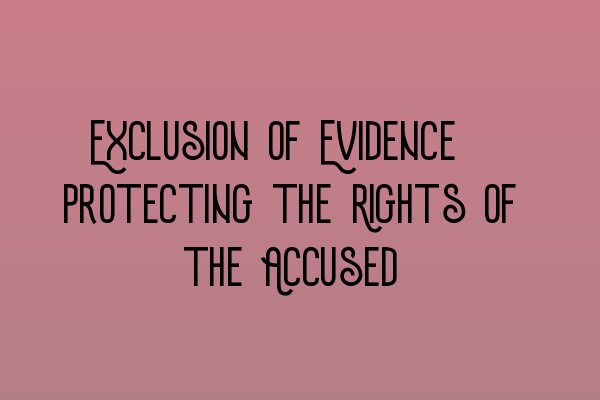Exclusion of Evidence: Protecting the Rights of the Accused
At SQE Criminal Law & Practice Law UK, we strongly believe in upholding the rights of the accused and ensuring a fair trial process. One key aspect of this is the exclusion of evidence. In this blog post, we will delve into the importance of excluding certain evidence, the legal principles behind this, and how it contributes to protecting the fundamental rights of the accused.
Why is the Exclusion of Evidence Important?
The exclusion of evidence plays a crucial role in safeguarding the rights of the accused. It is designed to prevent the use of evidence that has been obtained unlawfully or in violation of the defendant’s rights. By excluding such evidence from being presented in court, it helps to ensure a fair trial and maintains the integrity of the criminal justice system.
Excluding inadmissible evidence is essential as it prevents the prosecution from relying on evidence that has been unlawfully obtained. It acts as a check and balance to avoid the violation of the accused’s rights, such as privacy rights or freedom from unreasonable searches and seizures. By excluding evidence, the court sends a strong message that the ends do not justify the means and that the rights of the accused must be protected at all costs.
The Legal Principles Behind Excluding Evidence
The exclusion of evidence is rooted in various legal principles that aim to ensure a fair trial and protect the rights of the accused. Some of these principles include:
- The Exclusionary Rule: This rule states that evidence obtained in violation of the accused’s constitutional rights, such as the right against self-incrimination or the right to be free from unreasonable searches, must be excluded from the trial. The Exclusionary Rule acts as a deterrent against unlawful practices by law enforcement and serves as a safeguard against wrongful convictions.
- Fruit of the Poisonous Tree: This concept holds that evidence derived from unlawfully obtained evidence is also considered tainted and must be excluded. The rationale behind this principle is that allowing the use of such evidence would indirectly reward the unlawful conduct of the authorities.
- Reliability and Probative Value: Evidence that is unreliable or lacks probative value may be excluded from trial. This principle ensures that only relevant and reliable evidence is presented to the court, preventing unfair prejudice against the accused.
These legal principles work together to create a fair and balanced criminal justice system, where the rights of the accused are protected and upheld.
Protecting the Rights of the Accused
Exclusion of evidence is an effective way to protect the rights of the accused. By excluding unlawfully obtained evidence, the court sends a clear signal that police misconduct or any violation of the accused’s rights will not be tolerated. This not only ensures a fair trial for the accused but also encourages law enforcement to act within the boundaries of the law.
As criminal law practitioners, we understand the importance of upholding the rights of the accused and ensuring a fair trial. Our SQE 1 Practice Exam Questions and SQE 1 Practice Mocks FLK1 FLK2 articles provide valuable resources to help prepare law students for their SQE 1 exams. Additionally, our SQE 2 Preparation Courses and SQE 1 Preparation Courses are specifically designed to equip aspiring solicitors with the necessary knowledge and skills to succeed in their legal careers.
It is crucial for legal professionals to stay updated with the latest developments in criminal law and practice. By attending our courses and staying informed, lawyers can continue to protect the rights of their clients and contribute to a just and fair criminal justice system.
Conclusion
The exclusion of evidence is a cornerstone of the criminal justice system, protecting the rights of the accused and ensuring a fair trial process. By upholding the legal principles behind the exclusion of evidence and continually advocating for the rights of the accused, we can contribute to a just society where the rights of all individuals are respected and upheld.
For more information about the SQE exams and important dates, please visit our article on SRA SQE Exam Dates.
